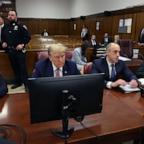Health Highlights: Oct. 4, 2008
Oct. 6 -- Here are some of the latest health and medical news developments, compiled by editors of HealthDay:
Norovirus Outbreak Strikes Georgetown University
More than 170 Georgetown University students in Washington D.C. have become ill from a norovirus that caused nausea, diarrhea, and dehydration during the past week, the Washington Post reports.
So concerned with the viral infection were school and health officials that Georgetown's football game Saturday against Colgate University in Hamilton, N.Y. was called off, according to the Associated Press.
There has been only one hospitalization for observation, the Post reports.
Norovirus infections have become notorious in recent years, occurring with some frequency on cruise ships and other places where the public gathers to eat and socialize. It is spread by direct huiman contact or through contaminated food.
In addition to nausea and diarrhea, the U.S. Centers for Disease Control and Prevention says other symptoms include stomach cramps and fever. The condition usually last about two days, according to the CDC.
Georgetown and District of Columbia officials haven't yet identified the cause of the outbreak, the Post reports, but the campus is being subjected to a decontamination designed to keep the outbreak from spreading.
"Our job now is to continue to treat the sick and, most importantly, to prevent the spread of the illness," James C. Welsh, assistant vice president for student health told the newspaper. "Hand-washing is going to be our mantra."
-----
Leading Psychiatrist Allegedly Failed to Disclose Pharma Payments
A leading U.S. psychiatrist allegedly failed to report to his university at least $1.2 million in pharmaceutical company consulting fees, The New York Times reported Friday.
Dr. Charles Nemeroff of Emory University is the latest physician to be involved in growing controversy over drug maker payments to physicians who speak or provide advice on the companies' behalf.
The newspaper cited, as an example, a letter Nemeroff signed in 2004 telling Emory officials that he thought he would receive less than $10,000 in such fees from GlaxoSmithKline. He went on to receive $170,000 in income that year from the British pharma giant, the Times reported.
Congress, led by Sen. Charles Grassley (R-Iowa), is investigating the conflict-of-interest disclosures provided by many prominent U.S. physicians, comparing them with drug company documents to make sure the two sets of records agree.




